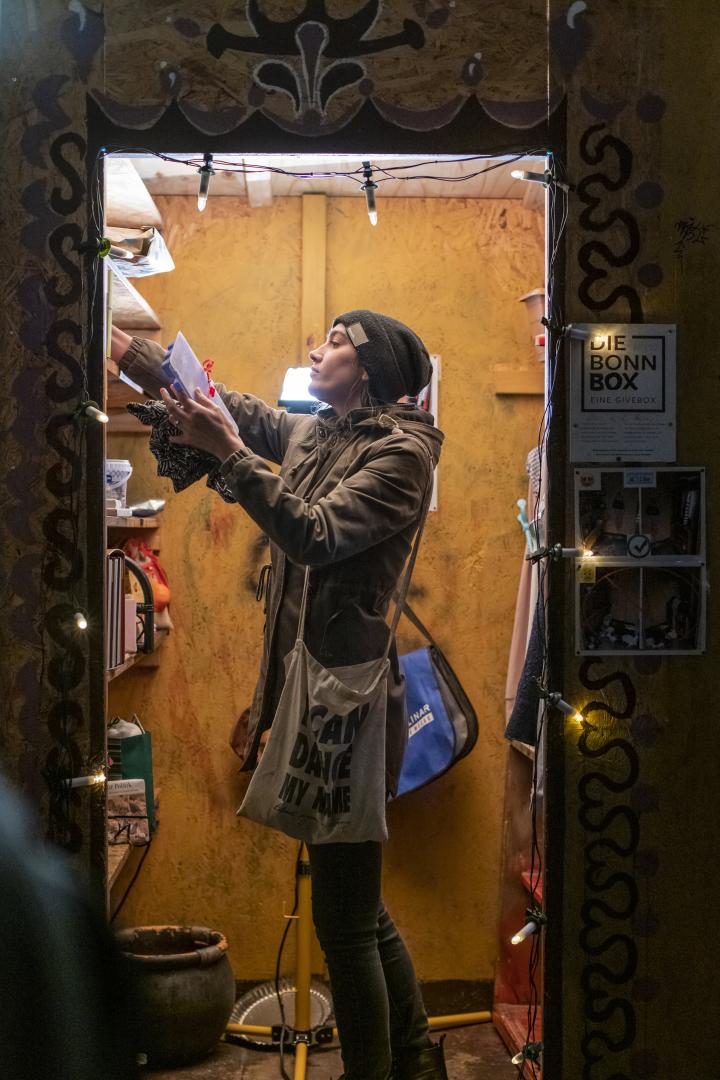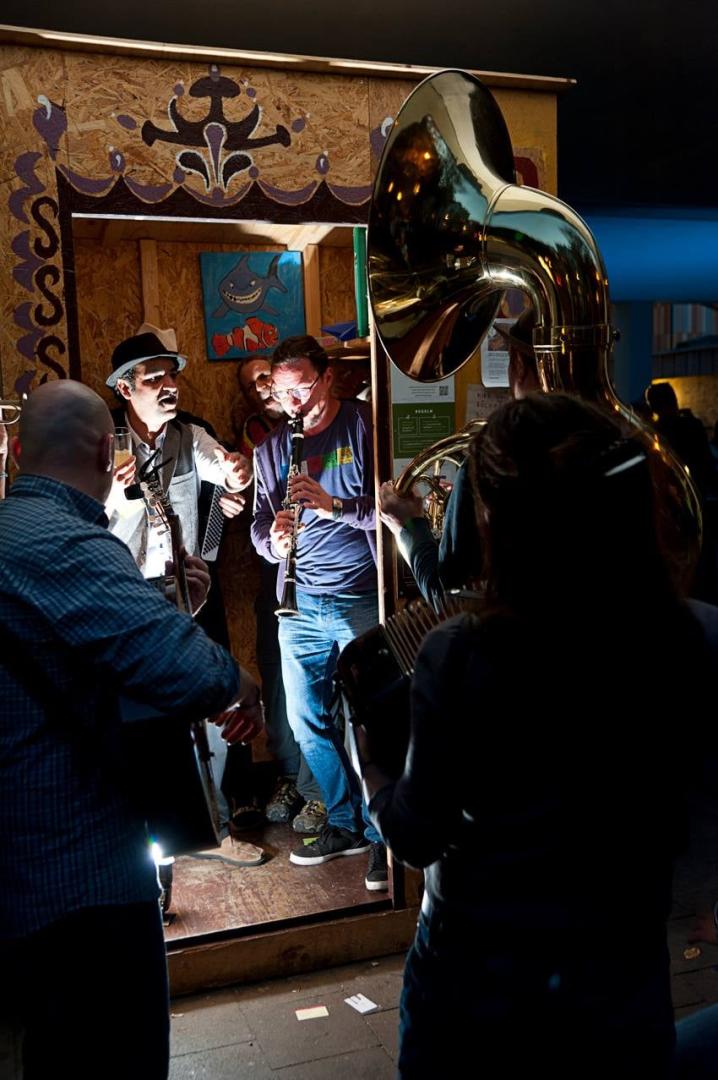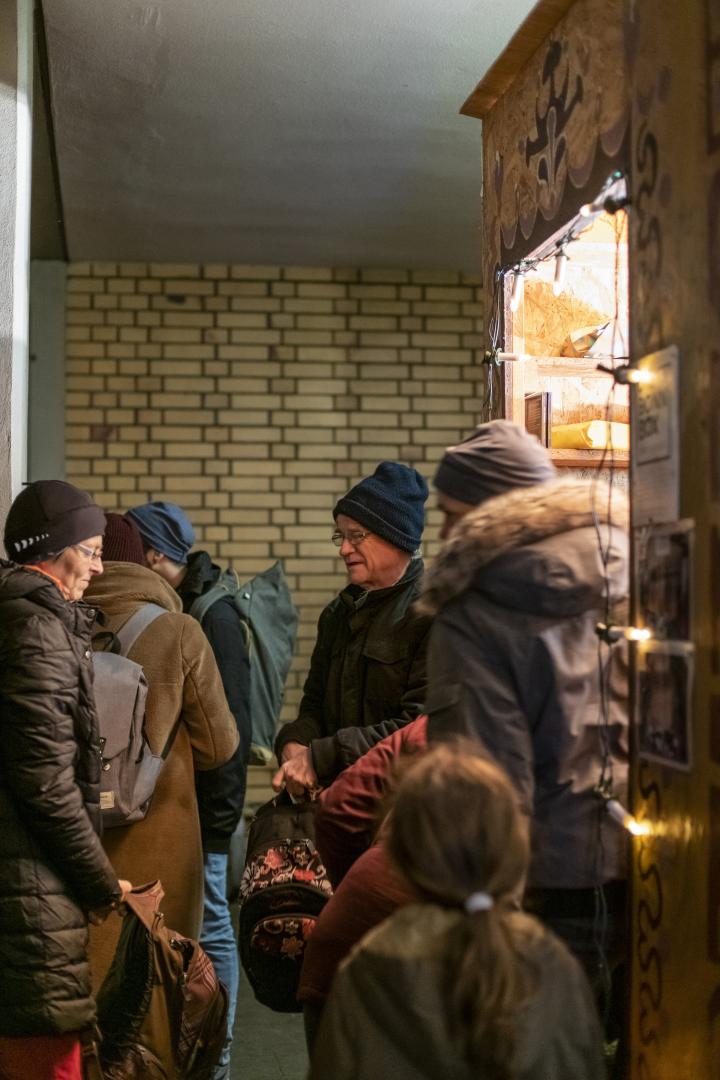FREEBOX
Basic information
Project Title
Full project title
Category
Project Description
Freeboxes are places where you can bring items that you no longer need yourself, but which are too good to throw away. On the one hand, a Freebox becomes a place where environmental awareness and sustainability are lived, but on the other hand it also becomes a meetingpoint of responsible and inclusive neighborly togetherness: here the principle of equality and low-threshold access applies to everyone - regardless of origin, income, educational background, age, gender or religious background.
Project Region
EU Programme or fund
Description of the project
Summary
The Freebox is set up together with suitable partners (municipalities, charitable institutions, associations) at locations in the public space. It is a publicly accessible and weatherproof closet for everything that is too good to be thrown away and what someone else would like to use. The Freebox enables people to exchange things and give them away. Objects of all kinds that you no longer need yourself are handed in anonymously, while others may even need them and can continue to use them. In addition to books, these are mainly toys, clothes or the old set of pots from the basement, etc. By exchanging and sharing, the life of an infinite number of everyday objects is extended and a contribution is made to avoiding waste and conserving resources. The Freebox thus serves to avoid waste within the meaning of the European Waste Framework Directive and represents a process for reuse within the meaning of Section 3 (21) of the National Recycling Management Act, in which "products or components that are not waste are used again for the same purpose for which they were originally were intended." In particular, the aspect of waste avoidance as well as the new social and cultural impulses associated with the setting up of Freeboxes in the communal area show a high level of attention and response from the partners considered. On the one hand, a Freebox becomes a place where environmental awareness and sustainability are lived, but on the other hand it also becomes a meeting point of responsible and inclusive neighborly togetherness, because here the principle of equality and low-threshold access applies to everyone - regardless of origin, income, educational background, skin color, sexual orientation and religious or ideological attitudes. In addition, the Freebox empowers the residents of a district to organize themselves and to commit to a solidarity-based way of life. They become change agents of a just socio-ecological transformation.
Key objectives for sustainability
Exchanging and sharing of items prevents unnecessary waste of resources by extending the life of an infinite number of everyday objects. In this way, the Freebox makes a valuable contribution to the re-use of everyday objects in our “throwaway society” and ultimately also to avoiding unnecessary rubbish. Because not everyone goes to the flea market, gives old things to a social department store or to a second-hand shop. Some things are also no longer “good enough” to sell, but that doesn't mean they have to be thrown away.
In addition, a Freebox creates an awareness for more sustainble and solidary-based life, make people happy with found treasures and, last but not least, also creates a social and communication meeting point where people from all social classes get to know each other and exchange stories about their everyday lives.
The Freebox raises trust which is an important prerequisite for people's willingness to share responsibility for the community. Like in families, in the circle of friends or relatives there is a form of economy that gets by without money - in which a lot is constantly shared or given away. Here exchange takes place on the basis of solidarity and reciprocity and not for profit reasons. The Freebox promotes an expansion of a social circle in which this gift economy is practiced. In a context in which there is trust, lifestyles are dematerialized: What is shared does not have to be bought and it does not have to be produced either. The relationship replaces materiality. This form of economy can make transformation possible even where financial resources are scarce.
The concept of the Freebox acts on the four pillars of sustainability:
- Economy: common good, sharing, gift economy
- Environment: re-use of resources, waste avoidance, awareness raising
- Society: inclusive and diverse meeting point, empowerment, change agents
- Culture: community arts, citizens' council simulations, self-administration of an urban good
Key objectives for aesthetics and quality
The representative and trademarked layout and design of the Freebox offers a new standardized urban furniture appearance with a high recognition value. A Freebox is regionally handmade in the Cologne-Bonn area and consists of carefully researched and selected material that is extremely stable, weatherproof and therefore also durable and sustainable. The materials used include above all fire-resistant panels, custom-made gratings and doors with plexiglass. Each Freebox can be supplied with electricity for lighting from a specially installed solar panel. Thanks to the use of doors in particular, it is designed to be as weatherproof as possible, even with constant accessibility.
The whole Freebox can be used as an artistic space for graffitti artists or other paintings co-created in a public community arts workshop.
Thus our aesthetic approach is to combine regional handicraft, co-creative community processes, self-administration (governance) and arts. We see ourselves as border crossers between science, arts and civil society, theory and practice as well as bridge builders between different systems and approaches in order to develop transformative literacy. We believe that successful urban transformation must be understood as a learning process and, in the sense of a dynamic of trial and error, engage in a culture of experimentation.
Key objectives for inclusion
On the one hand, a Freebox becomes a place where environmental awareness and sustainability are lived, but on the other hand it also becomes a stomping ground of responsible and inclusive neighborly togetherness: here the principle of equality and low-threshold access applies to everyone, regardless of ethnic origin, income, educational background, skin color, sexual orientation and religious or ideological attitudes. The Freebox as a meeting place in public space works against discrimination and marginalization and prevents loneliness in our society.
To increase acceptance and identification with the Freebox and their opportunities in the neighborhood, we offer exciting community building workshops on site before and after the construction. This includes various educational campaigns, citizens' council simulations, participatory art events or upcycling performances.
Results in relation to category
The Freebox has already been very well received as urban furniture at two locations in Bonn. The results and impacts can be viewed from several perspectives:
- Initiators: The idea of building a Freebox prompted the initiators to set up a non-profit entrepreneurial company in order to open up new locations with other partners.
- Carer: The associations and freelancers that take care of the Freebox have received positive feedback from the neighbourhood and have been empowered as change agents and so-called "climate heroes".
- Citizens: Citizens benefit from the exchange process as well as from the new inclusive meeting point with cultural offers in the neighborhood. They recognize sufficiency, clearing out and creative reduction of their resource consumption as a future-oriented principle. The items found in the Freebox can serve citizens who can't afford to buy them or citizens who don't want to buy them as new.
- Politics and local administration: The Freebox has received positive feedback from local political parties and the administration. They funded a part of the project implementation.
- Media: The German-French TV broadcaster ARTE as well as regional radio, television and newspapers reported positively about the Freebox and spread its idea and principles among the population.
- Cultural life: local artists were able to realize community events together with the neighborhood. The "World BEAThoven Project", which took place during the anniversary year for Beethoven's 250th anniversary, could also be presented at the Freebox. The slogan of the project was: REDUCE - REMIX - REUSE (www.taxi-mundjal.com/beathoven.html)
How Citizens benefit
The Freebox offers the opportunity to be used as an ecological, fair, inclusive, social, cultural and communication space. It is also a common good which belongs to everybody. Like the agora in the ancient Greek polis, the Freebox can be seen as a public gathering place where direct democracy emerges. As we believe that a just socio-ecological transformation can succeed above all if it is not experienced as an additional external control and incapacitation, but enables citizens to gain more self-determination and creative participation.
Through involvement of neighbourhood associations, the project is realized in an already existing living social structure of individuals which now get a visible point in the public space. By taking care of the Freebox on a daily basis, they feel empowered by becoming change agents and so-called "climate hereos". In addition, their experience of self-organization is an important aspect that contributes to the success of the project and strengthens the community feeling in the neighborhood.
Citizens who aren't part of the caring association benefit from the Freebox' Give-And-Take principle as well as from the new inclusive meeting point with cultural offers in the neighborhood. They recognize sufficiency, clearing out and creative reduction of their resource consumption as a future-oriented principle.
Innovative character
Our innovation is to contribute to a just socio-ecological transformation through a transdisciplinary and hollistic applied transformation design at the local level. Transdisciplinary means, above all, the unification of many overarching aspects that are important for a sustainable transformation. In the case of the Freebox these are: Participation in the sense of innovative community building tools (co-creative arts events, upcycling workshops, etc.), waste-avoiding and resource-saving in the sense of the sustainability goals of the UN (SDGs) and the National Recycling Management Act, socio-cultural impacts in the sense of cross-generational and diverse revitalization of a district as well as in the empowerment of citizens who become change agents.



